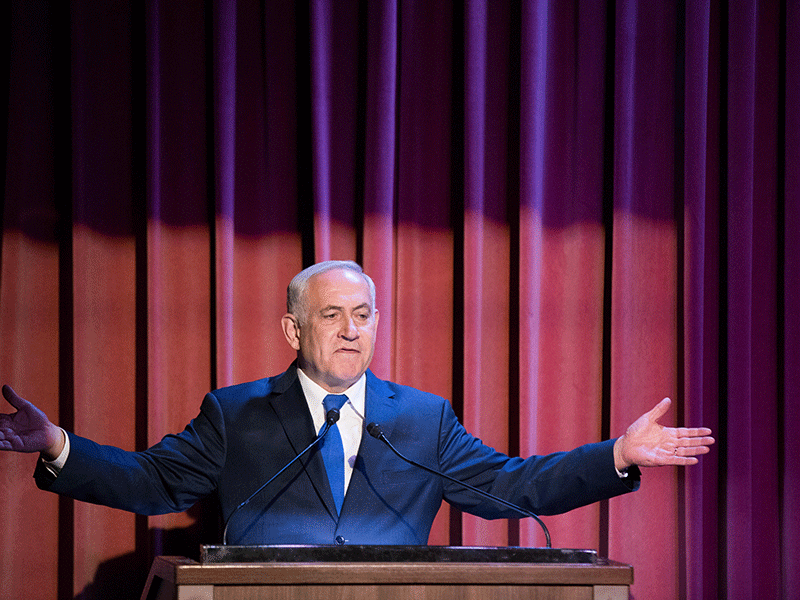Amid controversy for courting evangelical Christians, Jerusalem opened its first Christian Media Summit on Oct. 15 with a talk and Q&A with Prime Minister Benjamin Netanyahu who affirmed that “Israel has no better friends – I mean that – no better friends in the world than the Christian communities around the world.”
Netanyahu emphasized that Israel – and particularly Jerusalem – offers freedoms unparalleled in the Middle East. “You go to the holy sites, you go to the churches, others go to the mosques, and you know that this is a free city. Israel is the one country in a vast region where Christians not only survive – they thrive.”
Christians are interested in Israel for historical reasons, but also out of a desire to support fellow Christians living throughout the Middle East, which Netanyahu used as a springboard to mention Israel’s currently escalating tensions with Iran.
“I want to focus on Iran’s war against Christians,” he told participants. “Christians are brutally persecuted… Christians have been lashed for sipping wine during prayer services; Christians have been brutally tortured for doing nothing more than practicing their faith. Some world leaders are willing to ignore this repression and seek to appease Iran, but I am not one of them.”
Though Netanyahu’s talk was far more political than theological – including the announcement, to enthusiastic applause, that he was “looking forward to the day when the embassies of all your countries move to Jerusalem” – he played to his audience when asked about why Israel so often acts as a first responder to disaster scenes around the globe: “Because we’re a light unto the nations.”
Coinciding with the 50th anniversary of Jerusalem’s reunification, the four-day event was spearheaded by Minister of Jerusalem Affairs & Heritage Zeev Elkin, who called Jerusalem “a model for tolerance and dialogue.”
The event hosted over 130 delegates from Christian news organizations and publications around the globe and included journalists and executives from Trinity Broadcasting Network (TBN), Christian Broadcasting Network (CBN), Daystar, and God TV. Though nominally inter-denominational, most participants reflected an evangelical focus.
Dexter Van Zile, Christian Media Analyst for CAMERA, the Committee for Accuracy in Middle East Reporting in America, told The CJN that Christians worldwide, “want to be able to stand in solidarity with their fellow Christians.” Yet, he said, they often receive distorted media messages. “The Arab community in the West Bank is not really telling the whole story. Often times, the story their fellow Christians tell isn’t the entire story that they need to hear.”
Churches themselves can spread anti-Israel propaganda, said Van Zile. “The United Church of Canada has been particularly irresponsible,” he claimed. “When a church stands aside while jihadists carry out violence and murder against Jews, and then sides with the Palestinians without holding those jihadists accountable…that’s unbelievably irresponsible.”
Christian journalist Nicole Jansezian, who’s been in Jerusalem for 15 years, agreed with Netanyahu that “Christians have a decent life in Israel.” However, she told The CJN she believes Israel could offer more support to indigenous Arab and Armenian Christian communities, as well as those living in Gaza.
She also believes there’s not enough support for what she referred to as the “messianic community,” Jewish converts to Christianity who continue to practise elements of Judaism, believing their faith to be akin to Reform or Conservative Judaism.
There are up to 20,000 messianic Jews in Israel, out of more than 169,000 Christians – about 2 per cent of the country’s population. Contrary to popular belief, missionary activities are not illegal in Israel.
Van Zile acknowledged Christianity’s proselytizing impulse. “A lot of Christians still have a desire to share their faith. That’s a foundational aspect of the faith; that’s not going away. But at the same time, I think that Christians have reconciled themselves to the continued existence of Israel. A lot of Christians understand that if God’s covenant with the Jewish people is no longer in force, then how can they rely on God’s promises to Christians? Nobody wants to worship a God who changes his mind.”
READ: ISRAELI MKS VISIT OTTAWA
Evangelical Christians, particularly in the United States, have been influential not only in the media and through politics, but also through working directly with organizations like the Jewish Agency to promote aliyah and integration of Jewish olim into Israeli society. Last year, a Christian received one of the top awards for service to the Jewish community, presented by Keren Hayesod (the United Israel Appeal), and skeptics remain concerned that this interest and support come with strings attached.
“There’s a long history” between Christians and Jews, admitted Chris Mitchell, Middle-East bureau chief for CBN, who has lived in Israel since 2000. Nonetheless, he told The CJN, his organization is here simply because “we want to tell the truth about Israel.
“We want people to live out Genesis 12:2-3,” said Mitchell. “‘Those who bless Israel will be blessed, those who curse Israel will be cursed.’ They can pray for the peace of Jerusalem.”
The summit included sessions like “Resources for Telling the Israeli Story” and “Israel and the Fight Against Radical Islam.”
